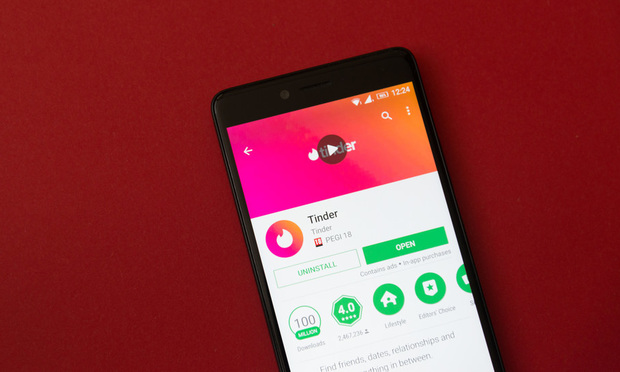Court of Appeal Reignites Age Discrimination Suit Against Tinder
Tinder previously convinced a trial court that its age-based pricing was based on market research showing younger users were more cash-strapped and less willing to pay for the enhanced version of its popular dating app.
January 30, 2018 at 06:10 PM
3 minute read

A California appellate court has revived a proposed class action claiming Tinder illegally charges older users more for the enhanced version of its dating app.
Tinder had convinced a trial court in Los Angeles to dismiss the lawsuit. The company's lawyers at Manatt, Phelps & Phillips had argued Tinder's pricing was based on market research showing that younger users, which Tinder charged as little as $9.99 for Tinder Plus, had lower relative incomes and were less willing to pay for additional app features than the 30-plus audience, who were charged $19.99.
But in a 26-page published decision issued Monday, the Third District Court of Appeal found that Tinder's age-based pricing violated the state's Unruh Civil Rights Act and Unfair Competition Law by relying upon “an arbitrary, class-based, generalization about older users' incomes as a basis for charging them more than younger users.”
“Were Tinder's justification sufficient, generalizations about the relative incomes of different age groups could be employed to rationalize higher prices for all consumers 30 and older in even the most essential areas of commerce—such as grocery shopping, gasoline purchases, etc.—even in instances where an individual did not in fact enjoy the economic advantages that are presumed about his or her age group as a whole,” wrote Los Angeles Superior Court Judge Brian Currey, sitting on the Third District pro tem.
Currey, who was joined in the opinion by Third District Justices Lee Smalley Edmon and Luis Lavin, found that regardless of what Tinder's market research showed about younger users as a group, some individuals “would not fit the mold.”
“Some older consumers will be 'more budget constrained' and less willing to pay than some in the younger group,” Currey wrote. The judge adopted the parlance of the popular dating app, writing, “Accordingly, we swipe left, and reverse.”
Manatt's Robert Platt and Tinder representatives didn't immediately respond to messages Tuesday.
The decision is a win for named plaintiff Allan Candelore and his lawyers, Alfred Rava of San Diego's Rava Law Firm and Kimberly Kralowec of the The Kralowec Law Group in San Francisco.
Kralowec said in a phone interview Tuesday the decision is a “very significant equal rights victory for California consumers.”
“I think it's very significant that the court held that before an age-based price differential can be approved there has to be legislative action recognizing that the particular group needs special protection,” Kralowec said. She noted that discounts for seniors and children are lawful since the legislature has recognized the need for special protections for children and seniors.
This content has been archived. It is available through our partners, LexisNexis® and Bloomberg Law.
To view this content, please continue to their sites.
Not a Lexis Subscriber?
Subscribe Now
Not a Bloomberg Law Subscriber?
Subscribe Now
NOT FOR REPRINT
© 2025 ALM Global, LLC, All Rights Reserved. Request academic re-use from www.copyright.com. All other uses, submit a request to [email protected]. For more information visit Asset & Logo Licensing.
You Might Like
View All
Buchalter Hires Longtime Sheppard Mullin Real Estate Partner as Practice Chair

Reality TV Couple and Pacific Palisades Neighbors Sue City of Los Angeles Over Loss of Homes to Fire
3 minute read
In Resolved Lawsuit, Jim Walden Alleged 'Retaliatory' Silencing by X of His Personal Social Media Account

No Two Wildfires Alike: Lawyers Take Different Legal Strategies in California
5 minute readTrending Stories
- 1We the People?
- 2New York-Based Skadden Team Joins White & Case Group in Mexico City for Citigroup Demerger
- 3No Two Wildfires Alike: Lawyers Take Different Legal Strategies in California
- 4Poop-Themed Dog Toy OK as Parody, but Still Tarnished Jack Daniel’s Brand, Court Says
- 5Meet the New President of NY's Association of Trial Court Jurists
Who Got The Work
J. Brugh Lower of Gibbons has entered an appearance for industrial equipment supplier Devco Corporation in a pending trademark infringement lawsuit. The suit, accusing the defendant of selling knock-off Graco products, was filed Dec. 18 in New Jersey District Court by Rivkin Radler on behalf of Graco Inc. and Graco Minnesota. The case, assigned to U.S. District Judge Zahid N. Quraishi, is 3:24-cv-11294, Graco Inc. et al v. Devco Corporation.
Who Got The Work
Rebecca Maller-Stein and Kent A. Yalowitz of Arnold & Porter Kaye Scholer have entered their appearances for Hanaco Venture Capital and its executives, Lior Prosor and David Frankel, in a pending securities lawsuit. The action, filed on Dec. 24 in New York Southern District Court by Zell, Aron & Co. on behalf of Goldeneye Advisors, accuses the defendants of negligently and fraudulently managing the plaintiff's $1 million investment. The case, assigned to U.S. District Judge Vernon S. Broderick, is 1:24-cv-09918, Goldeneye Advisors, LLC v. Hanaco Venture Capital, Ltd. et al.
Who Got The Work
Attorneys from A&O Shearman has stepped in as defense counsel for Toronto-Dominion Bank and other defendants in a pending securities class action. The suit, filed Dec. 11 in New York Southern District Court by Bleichmar Fonti & Auld, accuses the defendants of concealing the bank's 'pervasive' deficiencies in regards to its compliance with the Bank Secrecy Act and the quality of its anti-money laundering controls. The case, assigned to U.S. District Judge Arun Subramanian, is 1:24-cv-09445, Gonzalez v. The Toronto-Dominion Bank et al.
Who Got The Work
Crown Castle International, a Pennsylvania company providing shared communications infrastructure, has turned to Luke D. Wolf of Gordon Rees Scully Mansukhani to fend off a pending breach-of-contract lawsuit. The court action, filed Nov. 25 in Michigan Eastern District Court by Hooper Hathaway PC on behalf of The Town Residences LLC, accuses Crown Castle of failing to transfer approximately $30,000 in utility payments from T-Mobile in breach of a roof-top lease and assignment agreement. The case, assigned to U.S. District Judge Susan K. Declercq, is 2:24-cv-13131, The Town Residences LLC v. T-Mobile US, Inc. et al.
Who Got The Work
Wilfred P. Coronato and Daniel M. Schwartz of McCarter & English have stepped in as defense counsel to Electrolux Home Products Inc. in a pending product liability lawsuit. The court action, filed Nov. 26 in New York Eastern District Court by Poulos Lopiccolo PC and Nagel Rice LLP on behalf of David Stern, alleges that the defendant's refrigerators’ drawers and shelving repeatedly break and fall apart within months after purchase. The case, assigned to U.S. District Judge Joan M. Azrack, is 2:24-cv-08204, Stern v. Electrolux Home Products, Inc.
Featured Firms
Law Offices of Gary Martin Hays & Associates, P.C.
(470) 294-1674
Law Offices of Mark E. Salomone
(857) 444-6468
Smith & Hassler
(713) 739-1250






